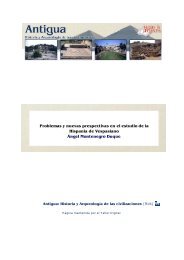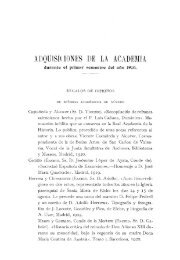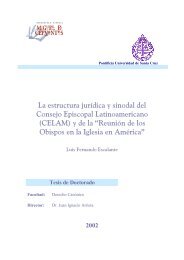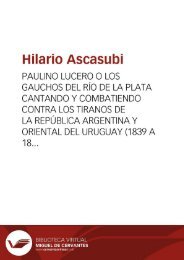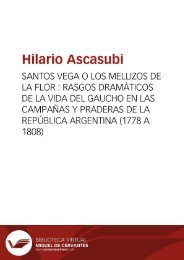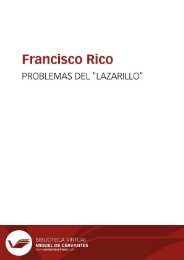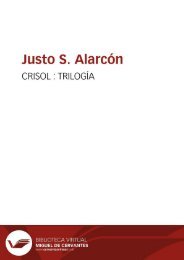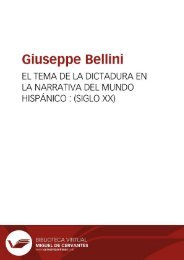Create successful ePaper yourself
Turn your PDF publications into a flip-book with our unique Google optimized e-Paper software.
I<br />
Anales galdosianos [Publicaciones periódicas]. Año XII, 1977<br />
Although galdosistas are almost unanimously agreed that Orozco should be studied in relation to<br />
the theme of charity in <strong>Galdós</strong>' novels, they are divided, as are the characters of the novel itself, as to<br />
whether he is a « santo laico » or a « demente » 77 . The answer to this question, as well as to<br />
what Orozco's illusions are, is to be found in <strong>Galdós</strong>' ideas about religion. A. A. Parker, in « Nazarín<br />
, or The Passion of Our Lord Jesus Christ According to <strong>Galdós</strong>» 78 , has succinctly summarized these<br />
ideas:<br />
The traditional type of sanctity is incompatible with the modern world, in which there is no place<br />
for hermits and contemplatives; the « vulgar » and « mediocre » world requires a «practical»<br />
type of sanctity expressed in a Christ-like charity...<br />
(p. 87)<br />
Further, he continues:<br />
What <strong>Galdós</strong> refrains from saying is as important as what he states. It has long been emphasized<br />
that he conceived religion as practical social action and had no conception of contemplative prayer.<br />
It should also be emphasized. that while there is nothing unchristian and uncatholic in his affirmation<br />
of human and natural values against a puritanical asceticism, he yet never shows anything that could<br />
77 See, e.g., Gilberto Paolini, An Aspect of Spiritualistic Naturalism in the Novels of B. P. <strong>Galdós</strong>:<br />
Charity (New York: Las Américas, 1969), passim ; and Arnold M. Penuel, Charity in the Novels of<br />
<strong>Galdós</strong> (Athens: Univ. of Georgia Press, 1972), pp. 71-76.<br />
78 AG , 2 (1967), 83-101. For the historical background to these ideas, see Penuel, pp. ix-xiii.<br />
<strong>Galdós</strong>' religious ideas were shared by his Victorian contemporaries: «All these novelists [Thackeray,<br />
Dickens, Trollope, George Eliot, Meredith and Hardy] concentrate on the theme of love, and all in<br />
one way or another see the relation of the self to the other as an attempt to satisfy religious longings<br />
in a world where relations to God are blocked. To put this another way, Victorian fiction may be said<br />
to have as its fundamental theme an exploration of the various ways in which a man may seek to<br />
make a god of another person in a world without God, or at any rate in a world where the traditional<br />
ways in which the self may be related to God no longer seem open» (J. Hillis Miller, The Form of<br />
Victorian Fiction [Notre Dame: Univ. of Notre Dame Press, 1968], p. 96). The theme of charity in<br />
<strong>Galdós</strong>' novels is part of what Amado Alonso has called « Lo español y lo universal en <strong>Galdós</strong> »,<br />
Materia y forma en poesía , 3rd ed. (Madrid: Gredos, 1969), pp. 201-221.<br />
51




